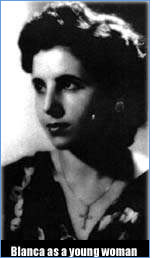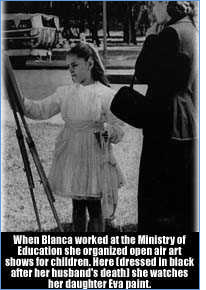Blanca Duarte de Alvarez Rodríguez
December, 1997
Much has been written about my sister Eva and about us, “the Duartes,” without keeping in mind that only a very small group of relatives, friends, and we, her family, knew our true story because it belonged to and still belongs to our private life. We enjoyed sharing these beautiful memories within the family during the few occasions when Eva allowed herself to take a break from her intense labor during those seven marvelous years full of love; those memories left with her when the Lord called her to Himself and they remained in our family, together with the promise-very difficult to keep-which Eva demanded that Mother and we make: not to answer attacks or insults.
One great joy the Lord has given me with my 87 years is that the oldest of my granddaughters, Cris, free of promises, wants to make known our true and beautiful life. I say “beautiful,” not because it was easy but rather because of the love and indestructible union which joined Juan Duarte to Juana Ibarguren and to us, their children, Elisa, Blanca (me), Juan, Erminda and Eva. Memories overwhelm my mind; I would have so much to tell, but I consider it interesting to share with you these years of my life.
At the beginning
of 1927, after our father’s death, our mother  worked incredibly long
hours to support her "small tribe" (as she liked to call
us, her five children). My sister Elisa helped by working at the Post
Office.
worked incredibly long
hours to support her "small tribe" (as she liked to call
us, her five children). My sister Elisa helped by working at the Post
Office.
After I finished
primary school I wished to continue my studies but I couldn’t do so
in my hometown because Los Toldos had no secondary schools.
One of my mother’s
cousins, Prudencio Ibarguren, quickly became my ally and for a long
time both he and I insisted that my mother let me leave my hometown
to continue my studies. Finally, Mother agreed because she also wanted
me to better myself in life.
It was hard for
my mother to be separated from her children; she wanted to protect
us and to keep us close to her because she loved us so much. But Prudencio
and I insisted and insisted until Mother allowed me to go to Bragado
and study at the Nacional School (a teacher training school).
Magdalena, Prudencio’s
mother, and her children Teresa, Pedro and Oscar welcomed me into
their home as another daughter. My mother and siblings gave me lots
of advice about the way I should behave and what I should do in Bragado.
I was the first to leave home.
Thus, in 1927,
as a member of the Ibarguren family under the watchful eyes of Magdalena
and her children, I began my studies at the National School.
I’II never forget
the first day of class, the words spoken by the Director, Rosa Reguera
(replaced by Mrs. Blanca Maria Luisa de Oyer when the school was nationalized).
Neither will I forget my classmates. I remember each one’s first and
last name and even though I can’t list them all, I would like to mention
Cora Duhalde, Euidosia Ipacagueire, Angelita Fossati Ruiz, Felisa
Llorente, Carmen Saldaño y Adela Puzzo. Many have already passed
on, but those of us who are left continue to keep in touch, still
united by our noble vocation as educators and by our exceptional training.
Mother and my siblings
moved to Junín after Elisa was transferred to the Junín
Post Office on August 2, 1930. Mother then insisted that I return
home.
When I was in Bragado,
either Mother or some of my siblings would visit me every fifteen
days; I would return to Los Toldos whenever we had a holiday (because
in those days we went to school even on Saturdays). Even though I
was very happy during the years I spent at Bragado, I missed my family
very much. I remember the last day of school and my farewell party
very clearly as a day of joy and of sadness.
However, Mother
had given the order that all her children should be reunited again.
I returned on August
2nd and completed my studies in Junín. As soon as
I had graduated and based on my GPA, Msgr. Serafin offered me a teaching
position in the Colegio de la Santa Unión de los Sagrados Corazones
(Sacred Hearts School).
 By
this time, with the help of Elisa’s job at the post office, Juan’s
job, and my teaching position, Mother was able to rest a little from
her fatiguing work as a seamstress. Thus my family lived in Junín.
The years went by and Juan was drafted into the Army. He was sent
to Buenos Aires. During the afternoons in Junín, Prime Ariní’s
Music Store set up loud speakers on the street corner outside the
shop. For the first time Eva’s voice was broadcast over the airwaves.
She recited a wide repertoire of poems with the same conviction and
professionalism which would later help her to conquer the Capital
as an actress. Even as a child, she had shown remarkable artistic
talent. In the beginning we believed that her desire to be an actress
was only a childhood dream. But her stubbornness in fighting for her
dream led to lots of problems at home. Mother’s opposition to Eva’s
dream was rooted in her desire to protect her child.
By
this time, with the help of Elisa’s job at the post office, Juan’s
job, and my teaching position, Mother was able to rest a little from
her fatiguing work as a seamstress. Thus my family lived in Junín.
The years went by and Juan was drafted into the Army. He was sent
to Buenos Aires. During the afternoons in Junín, Prime Ariní’s
Music Store set up loud speakers on the street corner outside the
shop. For the first time Eva’s voice was broadcast over the airwaves.
She recited a wide repertoire of poems with the same conviction and
professionalism which would later help her to conquer the Capital
as an actress. Even as a child, she had shown remarkable artistic
talent. In the beginning we believed that her desire to be an actress
was only a childhood dream. But her stubbornness in fighting for her
dream led to lots of problems at home. Mother’s opposition to Eva’s
dream was rooted in her desire to protect her child.
Eva wanted to travel
to Buenos Aires to participate in an amateur talent show. No one could
dissuade her. She showed the same iron will and determination which
would mark her for the rest of her life. She insisted and insisted.
At first Mother’s
response was ABSOLUTELY NOT. Then Doctor José Alvarez Rodriguez,
Rector of the National School of Junín, intervened. Dr. José
Alvarez Rodriguez, an extraordinary human being and an excellent role
model for young people, was the brother of my future husband, Justo.
Dr. Alvarez Rodriguez’s
advice was that parents have no right to thwart their child’s vocation.
"If the child has talent you must let her try her wings; if not,
you will return home happy that you supported her.
I can still remember
Mother’s irritation and the climate of nervousness and sadness that
prevailed in our house on the day our mother accompanied Eva to Buenos
Aires. Eva, however, was confident and serene.
 That evening Elisa,
Erminda and I listened to the radio program which paid homage to the
city of Bolivar. Were we ever surprised to hear Eva’s voice! She was
reciting the poem by Amado Nerve, "Where Do the Dead Go?"
Everything went so well that Pablo Osvaldo Valle, director of the
station, called her and Mother into his office and offered Eva a small
contract; this contract made it necessary for her to stay in Buenos
Aires.
That evening Elisa,
Erminda and I listened to the radio program which paid homage to the
city of Bolivar. Were we ever surprised to hear Eva’s voice! She was
reciting the poem by Amado Nerve, "Where Do the Dead Go?"
Everything went so well that Pablo Osvaldo Valle, director of the
station, called her and Mother into his office and offered Eva a small
contract; this contract made it necessary for her to stay in Buenos
Aires.
Mother returned
alone to Junín, furious with Rector and with all of us.
From then on, Eva
only returned to Junín for someone’s birthday or if one of
us was ill. She worked tirelessly to conquer the Capital and shared
those early days in Buenos Aires with our brother, Juan. Later, in
1936, my sister Elisa married Major Alfredo Arrieta and they went
to live in Buenos Aires. At last Eva would have more family with her
and Mother would be more tranquil and content.
